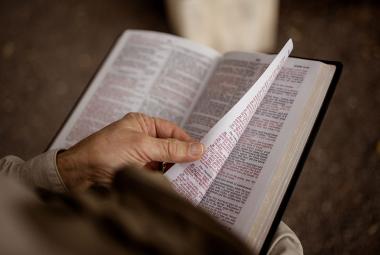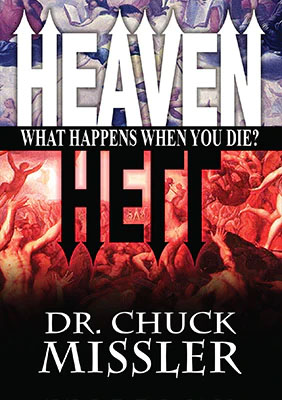What happens when we die?
This is one of those all-important questions. It’s one that should keep us all awake until we know the answer. Is there life after death? Should we declare, “Eat, drink and be merry, for tomorrow we die,” or do our actions in this life have repercussions in our eternities?
This subject of life after death is truly one of the toughest for many reasons. First, it’s painful to get our arms around. It’s a scary topic; one people love to brush away with trite clichés. Second, it has been plagued with many myths and superstition. Yet, this topic is unquestionably the most important I’ve ever addressed.
We like to kid around about death. A multitude of jokes begin, “An accountant/engineer/lawyer died and reached the Pearly Gates…” We find memes that say, “If I died and went to Hell, it would take me a week to realize I wasn’t at work anymore.” Even with all our humor about the issue, most of us understand the seriousness of the matter. If the world continues as it has, we are all going to die one day. We will all pass through that veil, and it’s vital we understand what we’ll face on the other side.
What happens when we die? When we pass through that portal, what’s the first thing we run into? Many people deny the existence of an afterlife, but we find that even skeptics wonder as they approach that final door.
What is Heaven like?
Is there really a Hell?
We are used to the media’s answers to these questions. The Far Side comics show God winning Jeopardy, or Satan and his cronies laughing at the notes in Hell’s “suggestions” box. When Bugs Bunny and Sylvester the Cat die, they float up to a cloud with little angel wings and harps. When Bill and Ted go to Hell, they are chased by their worst nightmares, but to escape they have to beat the Grim Reaper at games of Battleship, Clue and Twister. The media have their ideas about God, Satan, Heaven and Hell.
It’s interesting that the majority of American adults in our post-modern world continue to believe in life after death. Despite all the best efforts of the atheists and humanists in our universities, people generally believe that we do have souls, and they believe a final judgment does exist. According to the Pew Research Center’s 2014 Religious Landscape Study, a full 72% of Americans from all manner of backgrounds believe in some form of Heaven, defined as a place “where people who have led good lives are eternally rewarded.” Fewer people are willing to believe in Hell, but 58% (nearly three-fifths) still said they believe in a place “where people who have led bad lives and die without being sorry are eternally punished.”
Belief in Heaven and Hell isn’t relegated to those from mainline religions. According to the Pew Research study, even among those with no particular religious viewpoint, 50% believed in a place of reward in the afterlife, and more than one-third (36%) believed in a place of punishment.
Of course, when people talk about Heaven and Hell, they have their own ideas of what those places look like. They might agree on some kind of destination of eternal punishment or reward, but their versions of the afterlife can have nothing to do with what the Bible actually says. Even among those who believe in Hell, many regard it as a symbolic place. Some believe it is simply a state of eternal separation from God’s presence. Very few see Hell as an actual prison of torment and suffering where souls go after death. Fewer than one person in 100 thinks he or she will end up there.
The majority of Americans believe they will go to Heaven. There are handfuls of those who have no idea where they will go when they die, and others who believe they will return as another life form. Many people are confused and have vague mixtures of beliefs they’ve gleaned from a variety of religions. Another scattering of people believe they simply cease to exist after death. Their body goes into the ground, and that’s it.
Going to Heaven
Let’s get something straight right here at the very beginning of this book. The Bible is clear that there is both a Heaven and a Hell, and God wants everybody to go to Heaven. Did you know that? Peter and Ezekiel both tell us that God has no desire to punish us for our sins. He wants us to repent of our sins and be forgiven. That’s what God wants. Listen to God’s heart in the Old Testament:
But if the wicked will turn from all his sins that he hath committed, and keep all my statutes, and do that which is lawful and right, he shall surely live, he shall not die. All his transgressions that he hath committed, they shall not be mentioned unto him: in his righteousness that he hath done he shall live. Have I any pleasure at all that the wicked should die? saith the Lord GOD: and not that he should return from his ways, and live?
— Ezekiel 18:21–23
Near the end of the Bible, an elderly Peter explains that Christ’s delay in returning has been an act of mercy, giving us all more time. Jude 1:14–15 warns us that Christ’s Second Coming will be a time of judgment against those who cling to ungodliness, and Peter lets us know the Lord is putting it off for our sakes.
The Lord is not slack concerning his promise, as some men count slackness; but is longsuffering to us-ward, not willing that any should perish, but that all should come to repentance.
— 2 Peter 3:9
God wants us all to be saved. That’s precisely why He sent Jesus to die for us. God sent His only begotten Son to die for the sins of the world because He loves us and wants to rescue us from our predicament. This is what Jesus tells us in the most famous passage in the entire Bible:
For God so loved the world, that he gave his only begotten Son, that whosoever believeth in him should not perish, but have everlasting life. For God sent not his Son into the world to condemn the world; but that the world through him might be saved.
— John 3:16–17
One of the most surprising things we find in the Bible, however, is the God of Eternity does not always get what He wants. God is all-powerful, mighty and holy, but in His majesty, He has given us freedom to make our decisions, even if we reject Him.1 There will be those who refuse to turn from their wicked ways, who refuse to humble themselves before the God of all creation. Those foolish individuals walk down our streets every day, and sin must be punished. If we do not accept Christ’s death for our sins, we’re stuck facing that punishment ourselves. Christ’s sacrifice is the only way out of a hopeless situation. In the very next verses in John, Jesus says:
He that believeth on him is not condemned: but he that believeth not is condemned already, because he hath not believed in the name of the only begotten Son of God. And this is the condemnation, that light is come into the world, and men loved darkness rather than light, because their deeds were evil.
— John 3:18–19
Most Americans who believe in Heaven also believe they are going there. We hope they’re right, but unfortunately, many people have a completely incorrect idea about what it takes to get to Heaven. We find that a large number of people think that “being a good person” is the requirement, and that’s not what the Bible says. We cannot get to Heaven by our good deeds, or by obeying the Ten Commandments, or because God loves everybody and would never send anybody to Hell. These ideas are not biblical. Turning from sin is an important part of the process (and some of us have to do it every day), but it’s Christ’s blood that saves us.
Certainly, God loves us. That’s true. Certainly, God is not willing that anybody should perish. However, because God loves us, He gave us a way to escape our just punishment — and we have a part to play in the deal. Paul tells us plainly:
That if thou shalt confess with thy mouth the Lord Jesus, and shalt believe in thine heart that God hath raised him from the dead, thou shalt be saved. For with the heart man believeth unto righteousness; and with the mouth confession is made unto salvation. For the scripture saith, Whosoever believeth on him shall not be ashamed.
— Romans 10:9–11
God sent His Son to make the payment for our sins, and our ticket lies in believing in Him — in repenting and believing in the work that He did on the cross for us. The work we do for Christ, we do because we love Him, and because we want to serve Him. We cannot work our way into Heaven, and woe to us if we try.
On October 21, 2003, the Barna Group released their study, Americans Describe Their Views About Life After Death. According to the Barna study, the Americans of the early 21st century believed in Heaven and Hell even more strongly than those in the Pew Research study a decade later. In 2003, 76% of Americans believed in some kind of Heaven, but a full 71% believed in some kind of Hell. However, even then, fewer than 1% of those interviewed believed that they themselves were heading for Hell.
The Barna study found that a large number of Americans believed they were going to Heaven, and 43% thought this was true because they had, “confessed their sins and accepted Jesus Christ as their Savior.” That’s nearly half, which is encouraging. However, those who recognized their need for Jesus as Savior also held a variety of contradictory beliefs. Among those who saw themselves as “born again,” 10% said they believed that people are reincarnated after death, while 29% claimed it was possible to communicate with the dead, and a full 50% agreed that a person could earn their salvation based on good works.
On the other hand, we find that some self-described atheists and agnostics believe in an afterlife, and some even understand that Heaven is attained by seeking forgiveness through Jesus Christ. They might not believe Jesus is alive, or that He is God, but they understand that if God does exist after all, Jesus is the means to salvation.
It’s clear that even in the United States, still considered by many to be a “Christian” country, there is a widespread problem with misinformation. Too many Americans, even those who believe in God and claim Jesus as their Savior, have failed to do their homework. They believe whatever feels most comfortable to them, according to what they like or want to believe, and not according to the Word of God.
This is an area of real concern. Whether there is a Heaven or a Hell is an important issue to get right. These are questions we can’t take lightly. It’s vital to be certain we know how to get to Heaven and how to avoid Hell — and we shouldn’t wait until we’re on death’s door to consider the matter in depth. Any one of us can get hit by a truck tomorrow and have no further options.
In this little book, we will work to shed the baggage of our misconceptions and presumptions on this topic. We’re going to explore what the Bible says, and we’ll also consider the role of the creation and our conceptions of reality.
One of the most important things we can cover in this book is the importance of facing the truth. We have a serious problem with truth avoidance in our culture. We don’t like to deal with painful or difficult realities. We’d rather watch television or hide down at the local tavern. This is a particular subject area in which willful ignorance is most dangerous, especially since it is impossible for us to remain ignorant forever. The truth will show itself to us in the end, and knowing what it is will help us ensure that it lands in our favor.
The truth has little to do with what feels good to us. It rarely has anything to do with what we’d prefer. The truth is what it is, whether we like it or not.
William Paley is credited with a well-known statement against avoiding truth. He said:
There is a principle which is a bar against all information, Which is proof against all argument, And which cannot fail to keep man in everlasting ignorance. That principle is condemnation before investigation.2
We find an equivalent idea in the writings of Solomon, who said in Proverbs 18:13: “He that answereth a matter before he heareth it, it is folly and shame unto him.”
In his book, Chuck suggests that we all set aside the presumptions and presuppositions that we all bring to this topic — because we all have them — and let’s explore this difficult subject with the purpose of getting solid answers to hard questions.
This excerpt is from Chuck Missler’s book Heaven and Hell, available from the K-House store.
Notes:
- See our study The Sovereignty of Man for an in-depth analysis of what the Bible says about the balance between God’s sovereignty and human responsibility. ↩
- As quoted (or paraphrased) by William H. Poole in the 1879 book The British Nation: The Lost Tribes of Israel. The original is not to be found in William Paley’s own works, but something similar is found in his 1794 book, A View of the Evidences of Christianity. This quote is often incorrectly attributed to Herbert Spenser. ↩







